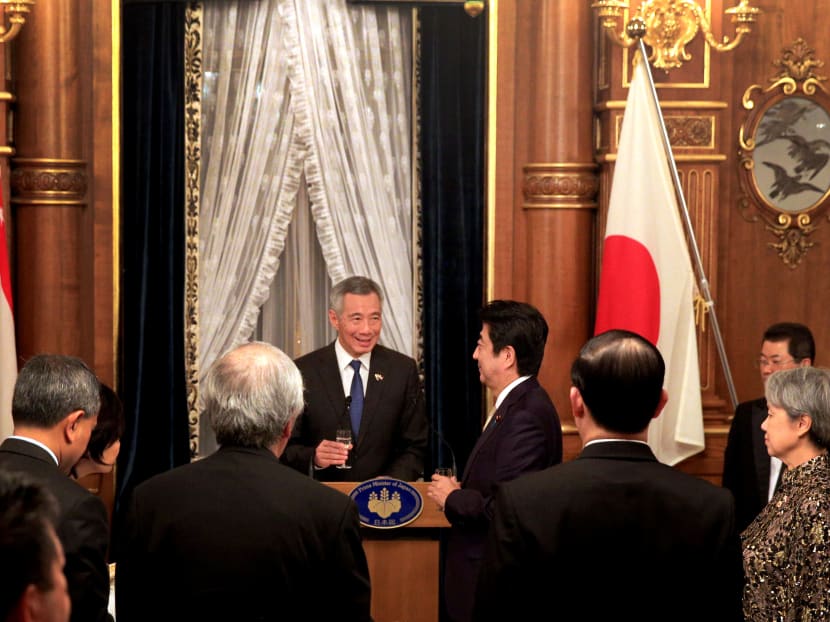Asia-Pacific must not turn inwards, says PM Lee
TOKYO — Warning that the Asia-Pacific region is entering a period fraught with “major geopolitical shifts and difficult internal conditions”, Prime Minister Lee Hsien Loong has urged regional countries to strengthen cooperation and not turn “inward”, in order to succeed.

Prime Minister Lee Hsien Loong and Japanese Prime Minister Shinzo Abe at the Akasaka State Guest House on Sept 28, 2016. Photo: Ministry of Communications and Information
TOKYO — Warning that the Asia-Pacific region is entering a period fraught with “major geopolitical shifts and difficult internal conditions”, Prime Minister Lee Hsien Loong has urged regional countries to strengthen cooperation and not turn “inward”, in order to succeed.
This is even more important for key players such as Japan, which “influence the tone for the region” and have played an “important and positive” role for decades, promoting regional peace, stability and development, he said on Thursday (Sept 29).
Mr Lee, who is on an official visit to Japan, was speaking at the Nikkei International Conference on the Future of Asia.
Many economies are still under-performing seven years after the global financial crisis in 2008 and 2009, he said.
“Workers are anxious about jobs. Protectionist, anti-immigrant, anti-globalisation sentiments are prevalent. Extremist protest parties on both the left and right are putting governments under pressure,” said Mr Lee, pointing to the European Union’s struggles with refugees and Brexit, and the “troubled and untypical presidential election” in the United States.
Asia is not doing too badly compared to the rest of the world but rapid change brings its own problems and each country has its own preoccupations, he said.
Japan is facing “deep-seated economic challenges”, Mr Lee noted. While this is being tackled by Japanese Prime Minister Shinzo Abe, with structural reforms being the most important, Japan needs to take bolder moves, he said.
Beyond domestic reforms, Japan also needs to maintain an outward orientation, said Mr Lee.
For one thing, Japan needs to make a greater effort to expose its people — especially the young — to the world.
Another way of strengthening Japan’s outward orientation is through free trade and the Trans-Pacific Partnership (TPP) is an important initiative for the country.
“Mr Abe made a bold and decisive move to join the TPP. He sent a clear signal that Japan intends to maintain an outward orientation. The TPP will also help Japan to bring about needed domestic change, and make the economy more competitive, including in sensitive areas,” said Mr Lee.
Japan, he said, should also have stable and peaceful relations with its neighbours and big powers, in particular with China and the US.
With the US, the US-Japan Security Alliance continues to be a cornerstone of regional stability, because it anchors the US in the region, while restraining countries in North-east Asia from escalating their disputes.
But for the alliance to endure, there must also be shared and growing economic interest and partnership, said Mr Lee. “That is why the TPP is strategically important. It will deepen US engagement with Japan and the region,” he added.
Singapore also hopes Japan will continue to play an active and constructive role in Asia, especially South-east Asia, Mr Lee said.
Asked during the dialogue session after his speech about what the ongoing US presidential election campaign — where candidates have spoken against the TPP — could spell for the ratification of the 12-country trade pact, Mr Lee said he hoped US President Barack Obama could get it ratified before his term ends, or during a “lame-duck” session of Congress. That is when the US Congress meets after a successor is elected but before the new president’s term begins.
If this does not happen, it could take years to bring the TPP deal back on track.
“In the heat of election, things are said which you may regret, but it takes time to take back the words. And as time passes, events develop, the agreements get overtaken by new developments … it is going to be very difficult to put the whole package together,” he said.
At best, this may take some years, and at worst, it may “unravel” the whole deal, “which would be a major strategic setback for the region”, Mr Lee added.
But working towards free trade in the region in other ways is something countries should do even if the deal falls through. For example, Singapore is working with Japan on enhancing the Japan-Singapore Economic Partnership Agreement. “It won’t make up for the TPP, but it will be a signal that business carries on, life goes on,” Mr Lee said.
On the possibility of China joining the TPP, Mr Lee said China is not yet ready, but has been interested in its impact on them, and the country could one day participate “if the political constellation, the stars are aligned in the right place”.
Adding that this could happen in five years, or longer, Mr Lee also said: “I think we should not see the TPP as a scheme to exclude China. It’s a scheme to promote free trade in the whole of Asia-Pacific and that includes China. So we must leave the door open.”






